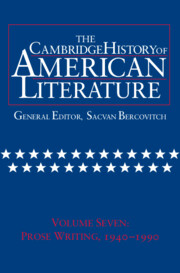Book contents
- Frontmatter
- Introduction
- The Drama, 1940—1990
- 1 Introduction
- 2 Tennessee Williams
- 3 Arthur Miller
- 4 Edward Albee
- 5 Sam Shepard
- 6 David Mamet
- 7 Changing America: A Changing Drama?
- Fiction and Society, 1940–1970
- After the Southern Renascence
- Postmodern Fictions, 1960–1990
- Emergent Literatures
- Appendix: Biographies
- Chronology, 1940–1990
- Bibliography
- Index
2 - Tennessee Williams
from The Drama, 1940—1990
Published online by Cambridge University Press: 28 March 2008
- Frontmatter
- Introduction
- The Drama, 1940—1990
- 1 Introduction
- 2 Tennessee Williams
- 3 Arthur Miller
- 4 Edward Albee
- 5 Sam Shepard
- 6 David Mamet
- 7 Changing America: A Changing Drama?
- Fiction and Society, 1940–1970
- After the Southern Renascence
- Postmodern Fictions, 1960–1990
- Emergent Literatures
- Appendix: Biographies
- Chronology, 1940–1990
- Bibliography
- Index
Summary
Tennessee Williams felt himself to be an outsider. His particular sexuality was expressly forbidden by law; his avocation as a writer seemed to put him at odds with a society that plotted its priorities along different axial lines. He came from a part of the country that seemed to have been abandoned by a nation whose model of the twentieth century had little use for those whose eyes were fixed not only on the past but on a fantasy reworked as myth. Even in the South, however, he felt out of place, aware, as he was, of its prejudices and of the violence that existed just below the veneer of civility. It is perhaps hardly surprising, therefore, that he wrote a series of plays that focused on the plight of those left behind by the bright lights and noise of the Twentieth Century, that symbol of modernity, the cross-country train that used to roll across America and that Hart Crane turned into a powerful metaphor in a poem, part of which Williams was to use as an epigraph to A Streetcar Named Desire.
His first public success, The Glass Menagerie, drew deeply on his own family situation. Indeed, he himself appears as Tom (his own name was Thomas), a young man torn between responsibility for his crippled sister (Williams’s own sister, Rose, was mentally damaged) and a free life as a writer responsible to no one but himself and to nothing but his craft. It was a play of considerable honesty and great subtlety.
- Type
- Chapter
- Information
- The Cambridge History of American Literature , pp. 10 - 19Publisher: Cambridge University PressPrint publication year: 1999

